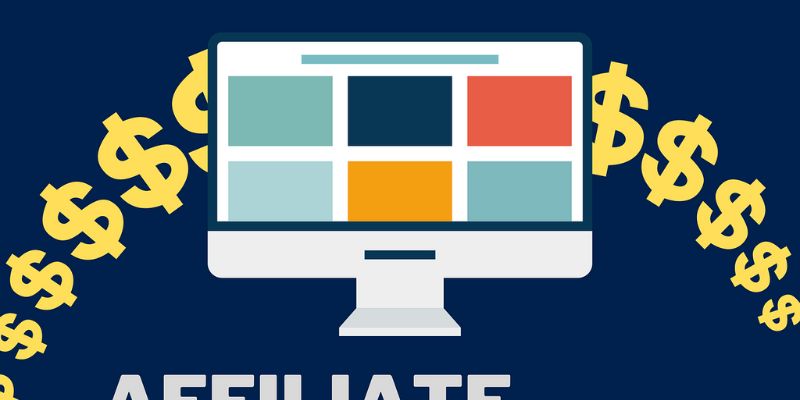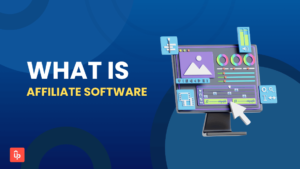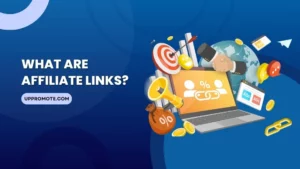Affiliate marketing functions on a performance-based model where affiliates earn compensation for directing customers to a merchant or service provider.
You might have heard somewhere about this business model and wondered, “Is affiliate marketing legit?” or “Can I make money with affiliate marketing?”
The answer is yes!
Our article provides essential information on affiliate marketing to obtain your answer clearly and comprehensively. Let’s scroll down to check it!
If you are asking this, you need a quick affiliate marketing 101 to see how real brands use it to grow.
Is Affiliate Marketing Legit?
Yes, affiliate marketing is legit! It’s a fantastic opportunity for online income generation.
Affiliate marketing is a win-win solution where affiliates and merchants can benefit. Affiliates can earn income by promoting products or services they have used or believe in. Meanwhile, merchants gain new customers with minimal exertion.
Once affiliates refer a customer to merchants, they can get a commission. Affiliates can use text links, banners, or other forms to direct customers to merchant’s websites. This process also helps brands to reach a wider audience without upfront fees like advertising.

The performance-based marketing structure has been popular due to its advantages. Research shows eight of every ten brands have an affiliate marketing program.
In addition, the market value of affiliate marketing in 2023 is over $17 billion. It is expected to reach $27.78 billion by 2027, a 91% increase compared to 2020.
So, affiliate marketing is not just legitimate but has potential as well. You can trust in its legitimacy and start your journey in the field!
Benefits of Affiliate Marketing for Merchants

Expand brand awareness
When working with affiliates, merchants can grow brand recognition. Usually, affiliates promote products and services to their audience. That helps merchants increase their exposure.
During their promotion, affiliates create content about their respective products. Then, they share it on social media and platforms, bringing more visibility to merchants’ goods and offerings. In other words, affiliates will spread the word about merchants.
Low-cost but high-ROI
Since affiliate marketing operates on a performance-based model, it reduces costs. In addition, it yields a higher return on investment (ROI).
It only requires payment for actual sales. This is different from standard advertising campaigns. Moreover, it can earn up to 15 pounds for every pound spent.
Improve the website’s SEO and traffic
In affiliate marketing, publishers generate content featuring links to the brand’s website. So, the brand’s site will gain a huge volume of backlinks. It helps elevate its off-page SEO scores and increase traffic through these links.
Enhanced Credibility
Collaborating with affiliates also helps merchants to increase their credibility. More affiliates joining a brand’s affiliate program means more reviews about such a brand’s product. A product with many reviews will be more reliable than one without opinions.
Further, customers believe in another person’s recommendations more than conventional advertising. They originate from a genuine person with firsthand experience of the product or service. So, if merchants aim to establish credibility in the market, affiliate marketing is a great choice.
Measure and analyze your marketing strategies
With an affiliate marketing system, brands can measure marketing results. They can also have deeper insights into customer behavior and conversions.
Thanks to these data and analytics, merchants can optimize their marketing campaigns. This helps them to get better performance.
Benefits of Affiliate Marketing for Affiliates

Monetize content
In affiliate marketing, publishers can earn commissions by recommending relevant products and services. Each successful sale can bring you money.
For instance, if you engage as a travel blogger, you can generate income from your blogs by incorporating links to travel brands’ websites like TripAdvisor, Booking.com, etc.
Diversify revenue streams
Affiliate marketing provides an additional income stream beyond traditional advertising revenue and sponsored content.
Did you know that the average income for affiliates can reach up to $94,546 per year? With this lucrative industry potential, you can add to your income portfolio.
Have an independent and flexible job
Engaging in affiliate marketing offers a flexible work arrangement. You can opt for part-time or full-time involvement and choose your working hours.
Additionally, you are free to select the programs you want to participate in and decide which products to promote, etc.
Low initial investment
Affiliate marketing is a field that requires very little to start. You may need to invest in a domain and hosting to build a website to do affiliate marketing.
You don’t even need a website for many programs; you can begin with your social media account or a YouTube channel.
This benefit makes affiliate marketing a nice choice for anyone seeking a business with little upfront investment.
Have chances to collaborate with brands
Another advantage of being an affiliate marketer is collaborating with brands. By joining affiliate programs, you create a beneficial relationship with brands. So you can widen your networks and establish valuable partnerships for potential cooperation.
Examples of Successful Affiliates for Your Inspiration
There are many case studies of successful publishers in the industry. You can follow them to draw inspiration for your affiliate marketing journey. Here are some examples:
Pat Flynn
He owns Smart Passive Income Blog – a well-known destination for learning affiliate marketing. Flynn stands out as one of the accomplished affiliate marketers with a resourceful blog for others to learn about this industry.
In 2008, Flynn lost his job at an architectural firm and started his affiliate marketing career. He generates income through affiliate marketing and reaches high earnings in the field. For instance, his monthly net income in December 2017 was over $125,000.

Michelle
She is a personal finance blogger who also runs affiliate marketing. Her blog shares information about making extra money and managing money.
With such high-quality content, her blog has 1,000,000 monthly page views. As a result, it drives great revenues for her.
Her blog generates an annual income exceeding $1.5 million. Most of these are from affiliate marketing, showing a successful affiliate marketing business.

Russell Brunson
The founder of ClickFunnels is quite famous for his three-book set. He is not only an entrepreneur but also a public speaker and a marketing expert.
He has achieved sustained success in affiliate marketing over the years. He has made commissions from diverse sources such as ClickFunnels, Amazon, etc.
You can visit his blog at Russell Brunson.

Common Affiliate Marketing Scams & How to Avoid
Though it’s a lucrative field, affiliate marketing is also a place where scams appear a lot. Below are some popular affiliate marketing scams and the methods for avoiding such stuff.
Affiliate marketing scams
1. Cookie stuffing
Cookie stuffing, also known as cookie dropping, is a common form of affiliate fraud. Scammers will put tracking codes from multiple affiliate networks onto a visitor’s computer.
When a visitor clicks a link and completes a purchase on the advertiser’s site, the scammers earn a commission instead of affiliates.
2. Fake products
This type of scam relates to creating ads or a webpage for a non-existent product. Scammers promote the product using the name of a reputable brand. This helps them exploit trust to attract potential customers.
Involving in such products may affect your credibility. As a result, you may lose audiences or customers.
3. Get-rich-quick schemes
In such schemes, scammers use exaggerated advertisements to persuade individuals that significant wealth can be acquired quickly with minimal effort.
This clickbait scam tends to attract newbies in affiliate marketing, which can lead to fake clicks or private data breaches, providing advantages to the scammers.
4. Pay-to-join programs
Another popular affiliate scam is pay-to-join programs. This type of scam requests payment via credit card or PayPal to enter an affiliate program. Since most reputable affiliate marketing programs are free, you should be aware of this fraud to prevent potential online theft of sensitive information.
5. Spoof traffic
This scam is popular in pay-per-click affiliate programs. This is where you see fraudsters send false click and impression data, often involving bots and irrelevant content, to make it look legit.
Subsequently, the marketing analytics program displays numerous referrals to the retailer’s site, all originating from bots. This deceptive tactic allows scammers to benefit from the fraudulent clicks.

Avoiding scams methods
1. Do your own research
Researching is an essential step before you join any affiliate program. You should study the company and its products or services to make sure it’s legitimate.
You may need to look through the company’s website to see if it contains reliable information. You can also look for reviews from other affiliates on the program or check reviews or ratings about the company and its products or services.
2. Review the program’s terms and conditions
Before enrolling, you should browse the terms and conditions thoroughly. A trusted program should include clear regulations on how the affiliate program operates, the commission rates, cookie terms, the payment process, and similar things.
3. Join a reliable network
Affiliate networks are a nice place to find reputable brands or merchants. Joining via a trusted affiliate network can help eliminate the risk of facing fraud. There are many great networks where you can register an account for free, like ShareASale, CJ Affiliate, Impact.com, etc.
4. Check anti-fraud policy
Fraud prevention should be the priority of reliable affiliate programs. So, when you research an affiliate program, you can check if they have an anti-fraud policy. The availability of such a policy can be a signal of a trusted program.
5. Try customer support services
Testing merchants’ customer support services is also a method for avoiding scams. This way may be clear and effective if you are a newbie in affiliate marketing.
You can find the merchant’s customer support team email or phone number on its site and contact them. A credible program should have a nice support team that provides good advice and diverse resources for affiliates.

How to Get Start With Affiliate Marketing?
1. Choose a suitable niche
You can start by researching popular niche segments, current trends, and thriving markets to identify a niche with long-term growth potential. Examples of highly profitable niches include fitness, finance, cooking, and blogging.
After that, consider your interests and what you want to promote on your channels. You can list your key skills and knowledge and identify areas where you excel. In addition, reflect on affiliate products or services you have firsthand experience with – consider whether you’d like to recommend them to others.
It’s also essential to conduct comprehensive research on the overall competitive landscape. Explore well-known affiliate marketing programs, identify optimal promotion platforms, and gather information on the average monthly earnings of other affiliate marketers.
2. Find an affiliate program
Finding a proper affiliate program is a step requiring time investment. To make an informed decision, you should spend hours researching various programs in your chosen niche.
An easy way is to use search engines to start. You can type [product] + affiliate program to see a list of different programs. Then, you can check reviews of other affiliates on each program to see whether it suits you.
Alternatively, you can also browse established programs like Amazon or Target.com. You may find the products you want to promote among such programs’ diverse product portfolios.
When choosing an affiliate program, remember that it should be within your niche to keep consistency. As a starter, you should aim for programs with reasonable commissions to have a moderate level of competition.
3. Select a channel
After having your niche and program, it’s time to pick a traffic channel. You might need to research to understand the algorithms of each channel to see which suits yours best. If you own any platform already having a certain number of followers, that’s a great base to start.
Besides, the channel should also be suitable for your content creation capability. If you prefer writing, a website or blog should be an ideal choice, but if you like speaking in front of cameras, YouTube or TikTok seems to be more fitting.
4. Build content
Content strategy should be an important matter in your affiliate marketing efforts. We suggest analyzing the content of leading users in your niche and studying user behavior before creating your own.
Content creators who create compelling content incorporate storytelling, entertainment, value, and distinctive perspectives. If you lack a unique viewpoint, endeavor to enhance your content by making it more informative or humorous for better attraction.
5. Grow audience and traffic
One of the difficult factors for starters in affiliate marketing is keeping the creation of content. Many affiliate beginners find it hard to have regular posts or videos, especially people working based on inspiration only.
Therefore, it’s essential to develop a specific posting plan that outlines the time, date, topic, and type of content (video, photo, live stream, etc.) to adhere to. You can cultivate a dedicated audience base by consistently posting and promoting content with affiliate links and achieve sustainable growth.
FAQs
Q: What is affiliate fraud?
Affiliate fraud constitutes an online criminal activity in the affiliate marketing field. Such activity usually involves deceptive tactics, including creating fraudulent accounts and using fake traffic sources to defraud merchants.
Affiliate fraud is harmful to businesses operating affiliate programs. Thus, it’s crucial to implement protective measures to prevent such occurrences.
Read more: Affiliate Marketing Scams Are Your Worst Enemy. Ways To Defeat Them
Q: Is high ticket affiliate marketing legit?
Yes, it is legit. High-ticket affiliate programs are available in many industries, e.g., luxurious traveling. When joining such programs, affiliates can have higher returns for their marketing and selling efforts.
Q: Can I really earn money from affiliate marketing?
Yes, you can. It’s possible to make money from affiliate marketing. However, the actual result depends on your effort and investment.
You’ll need to learn and research a lot to obtain great results from affiliate marketing. Such research will cover fundamental concepts and specialized matters.
Conclusion
Now, you should have your answer to the question, “Is affiliate marketing legit?” right?
Affiliate marketing is a legitimate and lucrative field to work and earn money. You can also join this industry and build your affiliate business. It helps you get nearer to your dream of building a passive income.
To do so, let’s start from small steps as of today!







